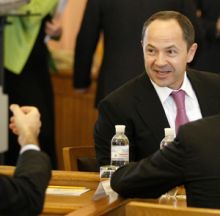On March 7, President Viktor Yanukovych of Ukraine voiced his social initiatives, subsequently described by Prime Minister Mykola Azarov as Ukraine’s “new social policy.” Azarov went on to say that “over the past 20 years there have been no such large-scale systemic and comprehensive social reforms.” However, after sharing the good news with the people, the Ukrainian administration found itself having another pain in the neck: money. Funding the president’s initiatives turned out to be easier said than done. Also, should this initiative money appear on the market, the latter would respond by another inflation upsurge. Even if the current administration does everything cleverly and cautiously, prices will jump on the crest of the opposition’s verbal wave.
According to the opposition, Yanukovych got carried away with his initiatives, forgetting that some of his ideas actually belonged to someone else. MP Arsenii Yatseniuk made a statement, on behalf of the BYuT-Batkivshchyna and NU-NS factions, saying that a miracle happened after the opposition had come up with its social initiatives; that Yanukovych recalled that he was the president and that he had to keep the promises he had made to the people of Ukraine.
He did and the people of Ukraine should thank him, as well as the opposition for carrying out its constitutional duty by lashing out at the current administration, now and then.
Our opposition vociferously attacked the State Treasury’s bill entitled “Financial Reporting in Conditions of Hyperinflation.” At the time media reported that this document was proof that Ukraine was readying itself for hyperinflation. The Ministry of Finance had to make statements refuting such allegations, explaining that the adoption of this standard is common practice across the world; that it has nothing to do with the current economic status; that this is a measure to be taken in order to harmonize the accounting procedures. The big question is: “Won’t these provocative inflation seeds end up in a fertile soil?”
In fact, the current administration should thank the opposition, assuming that its initiatives [appropriated by] Yanukovych have added strength to this party and raised its ratings. The ruling party will have to think hard about this “new social policy” and about how to implement it without damaging Ukraine. President Yanukovych says: “It’s extremely important to keep the exchange and inflation rates.” He believes that “some people will be convinced to keep their money on their bank accounts rather than close them, demanding hard cash… we will provide favorable terms and conditions.”
Yanukovych also believes that this will uphold the Ukrainian banks’ liquidity and help lower foreign loans’ interest rate in terms of funding and investment. The fact remains that a higher interest rate is best for a depositor. Any banker will tell you that a costly deposit spells a higher loan rate. I wonder who has done this disservice to our president?
His administration feels sure that there is enough central budget money to carry out these social initiatives. According to Iryna Akimova, deputy head of the Presidential Administration, “The Finance Ministry’s tentative estimates point to an extra 10-11 billion hryvnias, primarily at the expense of GDP which is ahead of schedule, in terms of imported and domestic products; also the scheduled increase in VAT revenues.” She adds that the bills on the wealth tax and liberalization of the mining market, if passed, will add some 0.5 billion and 5-5.5 billion hryvnias, respectively.
Akimova took the liberty of correcting her boss, explaining that low-interest housing loans, as part of the president’s social initiatives, won’t be available to all families (averaging 4,000 hryvnias’ worth of income per family): “This initiative must certainly address socially unprotected individuals… I don’t think that a sum in excess of one billion hryvnias can be discussed this year.”
The National Bank of Ukraine is the biggest obstacle on the road leading to these social initiatives, despite its express loyalty to the president and his government, simply because it is responsible for the hryvnia’s stability and buying capacity. NBU obviously would have preferred to keep the current weak inflation trend (with consumer prices showing 0.2 percent growth over the past three months, compared to those in the industries that went down somewhat in December and January, then went up gradually by 0.8 percent in February).
These social initiatives could be helped considerably by the International Monetary Fund and its promised loans, except that the Ukrainian administration adamantly rejects the IMF requirements to increase gas prices for the population. A deadlock. Azarov didn’t tell his Facebook correspondents whether Ukraine would resume cooperation with the IMF. He believes an answer to this question depends on the outcome of Ukraine-Russia gas talks. Will the IMF change its attitude? Probably, considering the appointment of a new head of the IMF mission to Ukraine.
Then what? Azarov keeps assuring that there is no threat, not the slightest sign of default for Ukraine. The man apparently counts on loans from China or Russia. Rumor has it that someone in China would like to have plots of land in Ukraine as collateral. What can Ukraine offer Russia?







